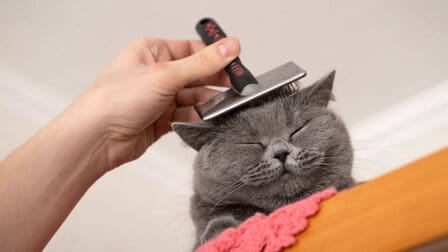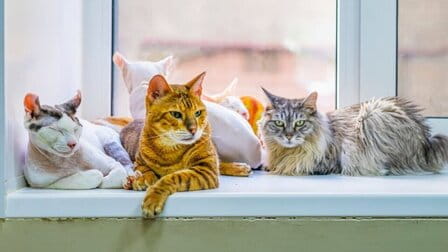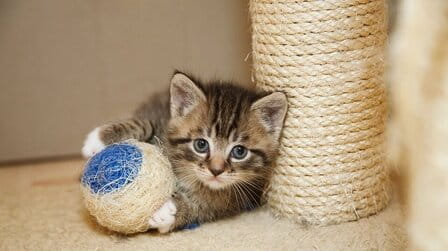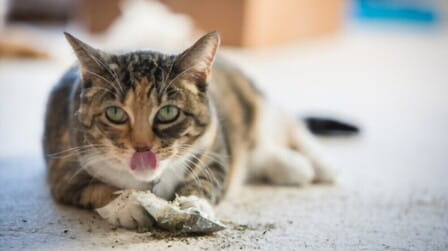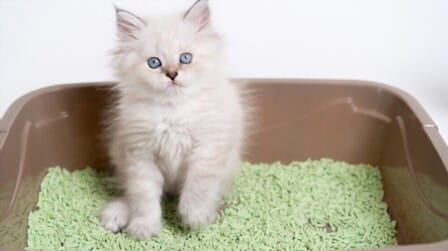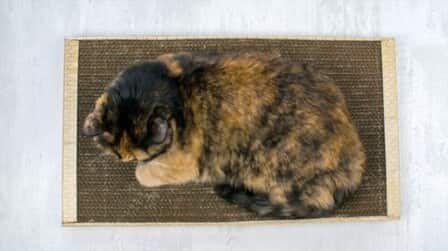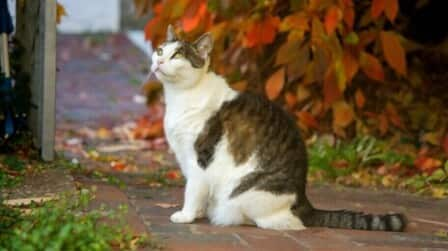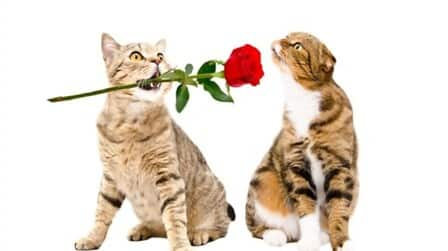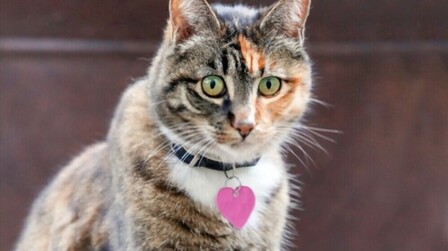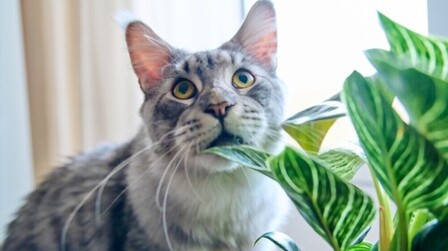Cats are great pets because they are intelligent, agile, and extremely affectionate. They often close their eyes when you stroke or hug them, but their voices continue to purr. But have you ever considered the reason for their cry? Many people believe that cat purring when petted and cuddled is a signal of comfort. According to pet owners, one of the happy expressions of cats is this. However, others disagree and believe that the cat's meows indicate that they are unhappy. But from a scientific standpoint, researchers have examined and discovered the mechanism of cat purring. To create that sound, they used the muscles of the larynx and diaphragm. Let's find out how cats purr and why they make them.
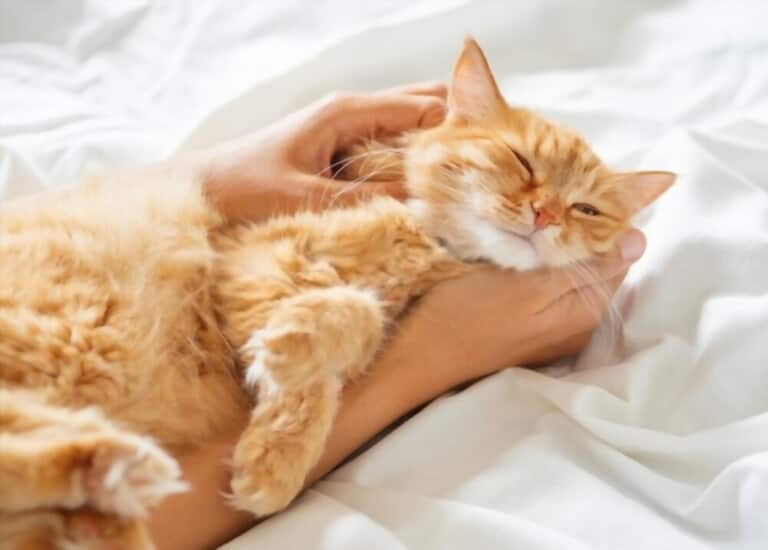
Why do cats purr?
Cats frequently engage in behaviors that we find challenging to comprehend. The same holds true, for instance, for the noises and chirps they make. Many people are curious as to why cats purr, is it because they are hungry? Please read the article that follows if you want more information on this subject.
Because they feel happy
Although it may sound unusual, cats often purr when happy, excited, and in love with something. Cats often jump on their laps, curl up next to their owners and purr when petted or played, accompanied by eyeball movements that seem completely intoxicated with pleasure.
They are hungry
Additionally, cats let their owners know that they need to be fed because they are ravenously hungry. Particularly if you train & feed them at regular intervals. And the cat purrs for food when this moment arrives. You observe that this call movement is also followed by the follow action, which involves persistently gazing in the owner's direction.
The connection between kittens with mother cats.
Cats often purr when they are young. This is to be expected based on the sounds made to communicate with the mother cat. They call to let the mother cat know where they are, invite the mother cat to take care of them and play with them. A mother cat's purr can be used as a lullaby to help her kittens fall asleep.
Because cats are stressed
There is a high chance they are agitated, angry or stressed if the growl resembles a growl and is followed by a hostile, unapproachable look. Meows are a form of emotional expression of cats, so you must pay close attention and monitor their health status for timely treatment.
To welcome other cats
Your cat may also purr when greeting another cat. There is nothing to worry about as cats usually communicate this way. They salute to show their joy, welcome, willingness to interact and make friends with others.
The cat is begging its owner for something.
In addition to communicating their needs to their owners, cats also purr. They may want to show them love, give them a gift, or amuse them with anything.
Cats meow for self-soothing and healing
Cats purr to comfort themselves when injured or sick, which is an energy-intensive activity. According to studies, purring helps the body vibrate, regulates breathing and relaxes the muscles and tendons of the body while also relieving a lot of their anguish. Cat purring helps ease their pain and speed up their recovery, especially after a fall. When cats are injured, purring soothes, relieves pain, and improves their mood. Studies also show that this sound helps cats quickly calm down and increase strength. The cat is immensely soothed by sound vibrations and frequencies.

How cats purr
When cats purr, their bodies are usually still, their eyes are usually half-closed, and there may be a slight vibration at the base of their chin. In fact, there is no exact scientific explanation for cat meows. According to the scientists, the movement of the diaphragm combined with the area of the cat's brain that governs the muscles of the larynx causes the purr. Vibrations 20–30 times per second occur in these muscles. Even if the cat is breathing normally, this still happens. As a result, they may purr when breathing, although cats produce a variety of meows with varying frequencies, what makes them unique is their peculiar purring sound, which runs from 25 to 150 Hz.

Unexpected benefits from cat purr
For all you cat lovers, the animal is like a best friend who is always there, cuddling and playing. And when we pet cats, they often purr with their eyes closed. Cats are weird, but did you know that when they purr, their health and yours will benefit. Have you ever spent a long and tiring day, and after just 5 minutes of cuddling with your cat, all worries disappear.
- Experts suggest that a cat's diaphragm and larynx are what produce the purr. And both cats and their owners benefit greatly from this cry in terms of health. The distinctive cat meows have a frequency between 25 and 150 Hz. This frequency is believed to be beneficial for humans, especially the brain, and beneficial for the treatment of a number of disorders.
- Stress, weariness, and shortness of breath can all be effectively treated using sound that has a frequency of 20 to 140 Hz.
- The range of 40 to 50 Hz improves muscular growth, enhances bone and joint health, and speeds up wound healing.
- In addition, numerous studies have demonstrated how cat owners can 40% lessen heart problems or stroke symptoms. The researchers also found that cat meows function as a low-energy skeletal muscle activation technique.
- The cat lives longer thanks to this stimulus. Because of this, we frequently see that cats have fewer aberrant symptoms of muscles and bones than dogs, despite climbing, running, and jumping all day.
Cat purr is well known for its many surprising benefits beyond those proven by studies. Hearing cats meow not only helps pregnant women but also has many other positive effects, some people believe that cat meows help scratches heal faster and prevent infection. Additionally, a cat's magic meow can aid in healing ligament injuries as well as muscle and tendon pain.

Some of your questions
The cat may not purr, so what?
Different cats purr in different ways and at different volumes. You can only tell if a cat is meowing if you touch its neck or throat and feel a vibration, which happens when some cats meow almost completely silently. However, some other cats don't seem to purr at all, so you can rest assured
Is it okay if the cat purrs too much?
It depends on your cat, some purring in response to a variety of requests or emotional states. It doesn't matter if their body tests normal and healthy. Once you know that, you can try to infer your cat's intentions and moods based on the circumstances. In addition, they are extremely sensitive and fickle.
Do cats ever show rage by purring?
There are many cases where cats, while roaring angrily, also quickly bared their teeth and looked very angry. In case outsiders attack, steal or chase cats.

Conclusion
You might be surprised at the unforeseen benefits of a cat's purr. Your feline friend is truly a doctor that can cure you of many ailments and also make you feel peaceful and content when it curls up at your feet. Give your cat enough time to cuddle and you should hear or feel a purr coming from the cat's throat. These sounds are easily recognizable, but not everyone understands them well enough. Give your cat a hug to appreciate all the little things they do for you every day after reading this article. Remember to take care of your companion cat and see the doctor regularly as your cat can detect health risks early.

